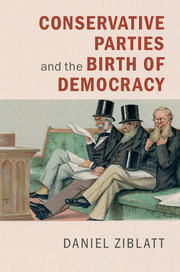Description
Conservative Parties and the Birth of Democracy
How do democracies form and what makes them die? Daniel Ziblatt revisits this timely and classic question in a wide-ranging historical narrative that traces the evolution of modern political democracy in Europe from its modest beginnings in 1830s Britain to Adolf Hitler’s 1933 seizure of power in Weimar Germany.
Based on rich historical and quantitative evidence, the book offers a major reinterpretation of European history and the question of how stable political democracy is achieved.
The barriers to inclusive political rule, Ziblatt finds, were not inevitably overcome by unstoppable tides of socioeconomic change, a simple triumph of a growing middle class, or even by working class collective action. Instead, political democracy’s fate surprisingly hinged on how conservative political parties – the historical defenders of power, wealth, and privilege – recast themselves and coped with the rise of their own radical right. With striking modern parallels, the book has vital implications for today’s new and old democracies under siege.
Proposes a new approach to the study of European democratization, highlighting a previously understudied actor in this process – conservative political parties – and filling a major gap in the existing literature
Assembles an original array of archival and other primary evidence to challenge the dominant approaches to the study of democratization in Britain and Germany
Written in clear, accessible prose, addressing contemporary themes in democratic countries, such as the threat posed to conservative parties by right-wing populist movements
Reviews & endorsements
‘Daniel Ziblatt has written an incredibly important book about the development of democracy in Europe. Based on in-depth qualitative research and extremely innovative use of quantitative data, he has given us a new picture of German and British political development in particular. Focusing on opponents of democratization, Ziblatt asks why anti-democratic elites accepted democratization in some places (like Britain) but vociferously and often violently opposed it in other places (like Germany). Ziblatt points to the strength of conservative parties as the key variable. This book will be invaluable to anyone interested in European political history, democratization more generally, and the ways in which thoughtful historical research can illuminate contemporary debates.’ Sheri Berman, Barnard College, New York
‘Daniel Ziblatt revolutionizes the literature on democratic transitions by linking it to subsequent democratic breakdown, and shows that it is the nature of conservative party organization that determines democracy’s long-run stability. His focus on democracy’s ‘first wave’ in the nineteenth century carries enormous implications for the future of democracy today.’ Francis Fukuyama, Olivier Nomellini Senior Fellow, Freeman Spogli Institute for International Studies, Stanford University, California
‘This book profoundly improves our understanding of historical regime trajectories. Only where inclusive, encompassing, and centralized conservative parties created a centripetal dynamic that could sideline reactionary challenges could regime change progress incrementally toward democracy. And only there, democracy proved resilient against renewed authoritarian challenges in the twentieth century. Unfortunately, Ziblatt’s book may also have timely implications for twenty-first century challenges to democracy.’ Herbert Kitschelt, George V. Allen Professor of International Relations, Duke University, North Carolina
‘This is the best book in comparative politics I have read in a decade. Conservative Parties and the Birth of Democracy is a book of stunning erudition and deep learning. It has profound implications for how we think about democratic development and dictatorship virtually everywhere in the world.’ Jeffrey Kopstein, Chair of the Political Science Department, University of California, Irvine
‘With immensely erudite historical comparison, quantitative evidence, and probing archival research, Daniel Ziblatt demonstrates that the organizational capacity of conservative elites makes the crucial long-term contribution to preserving liberal democracy. He has, I fear, written the political parable for our own times.’ Charles S. Maier, Leverett Saltonstall Professor of History, Harvard University, Massachusetts
‘First we had Capital in the Twenty-First Century, now we have Barrington Moore.’ James Robinson, Harris School of Public Policy, University of Chicago
Conservative Parties and the Birth of Democracy
For more books, click here

 العربية
العربية  English
English 




